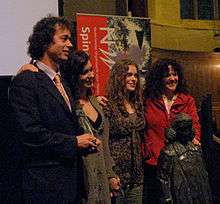Theo Rasing
Theodorus "Theo" Henricus Maria Rasing (born 26 May 1953) is a Dutch professor of experimental physics at Radboud University Nijmegen. His expertise lies in the field of magneto-optics. He was a winner of the 2008 Spinoza Prize.[1]
Theo Rasing | |
|---|---|
 | |
| Born | 26 May 1953 Didam, Netherlands |
| Citizenship | Netherlands |
| Alma mater | Radboud University Nijmegen |
| Awards | Spinoza Prize (2008) |
| Scientific career | |
| Fields | Physics,magneto-optics |
| Website | https://www.ru.nl/ssi/members/theo_rasing/ |
Career
Rasing was born on 26 May 1953 in Didam.[1] In 1976 he obtained a cum laude degree in physics from Radboud University Nijmegen. He obtained his doctorate from the same university in 1982. In 1997 he became professor at Radboud University Nijmegen.[1]
In 2008 he was one of four winners of the Dutch Spinoza Prize and received a 1,5 million euro grant.[2] In 2013 Rasing won a 2,5 million euro Advanced Grant by the European Research Council for a research proposal titled 'magnetisation at its fastest'.[3]
Rasing became a member of the Royal Netherlands Academy of Arts and Sciences in 2010.[4]
In February 2015 the Dutch newspaper de Volkskrant listed Rasing second on a list of funds obtained by researchers.[5]
References
- "Prof. Th.H.M. (Theo) Rasing". Netherlands Organisation for Scientific Research. 27 August 2014. Retrieved 12 September 2015.
- "NWO Spinoza Prize 2008". Netherlands Organisation for Scientific Research. 27 August 2014. Retrieved 12 September 2015.
- "ERC Advanced Grant for Theo Rasing and Mikhail Katsnelson". FOM. 21 August 2013. Retrieved 20 September 2015.
- "Theo Rasing". Royal Netherlands Academy of Arts and Sciences. Retrieved 12 September 2015.
- Martijn van Calmthout; Eline Huisman; Sybren Kooistra (21 February 2015). "Het prof. dr. Dagobert Duck-effect". de Volkskrant (in Dutch). Retrieved 20 September 2015.